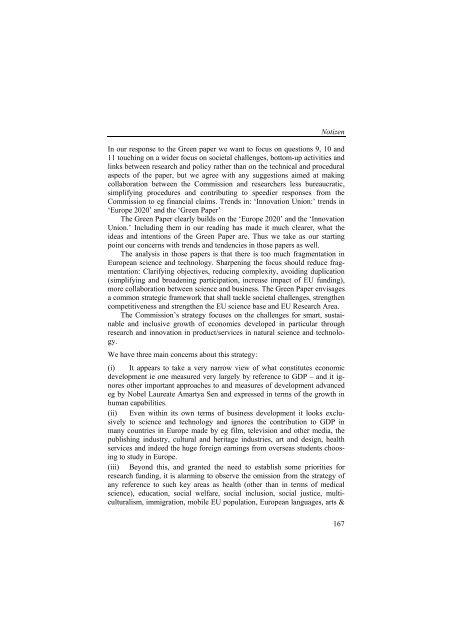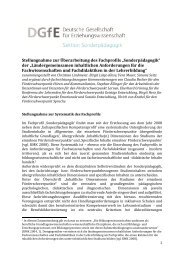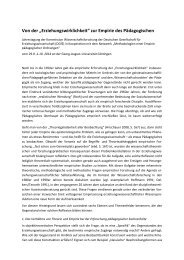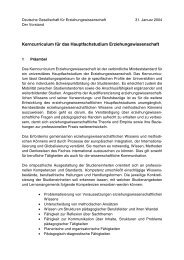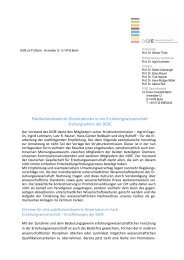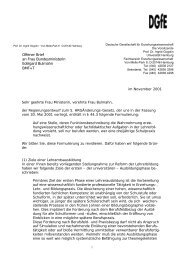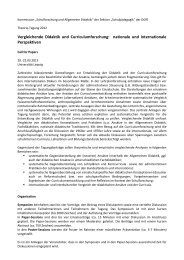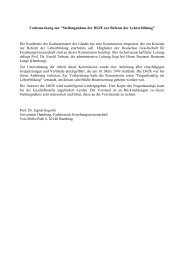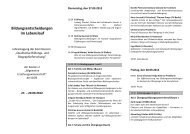Heft 43 - Deutsche Gesellschaft für Erziehungswissenschaft
Heft 43 - Deutsche Gesellschaft für Erziehungswissenschaft
Heft 43 - Deutsche Gesellschaft für Erziehungswissenschaft
Erfolgreiche ePaper selbst erstellen
Machen Sie aus Ihren PDF Publikationen ein blätterbares Flipbook mit unserer einzigartigen Google optimierten e-Paper Software.
Notizen<br />
In our response to the Green paper we want to focus on questions 9, 10 and<br />
11 touching on a wider focus on societal challenges, bottom-up activities and<br />
links between research and policy rather than on the technical and procedural<br />
aspects of the paper, but we agree with any suggestions aimed at making<br />
collaboration between the Commission and researchers less bureaucratic,<br />
simplifying procedures and contributing to speedier responses from the<br />
Commission to eg financial claims. Trends in: ‘Innovation Union:’ trends in<br />
‘Europe 2020’ and the ‘Green Paper’<br />
The Green Paper clearly builds on the ‘Europe 2020’ and the ‘Innovation<br />
Union.’ Including them in our reading has made it much clearer, what the<br />
ideas and intentions of the Green Paper are. Thus we take as our starting<br />
point our concerns with trends and tendencies in those papers as well.<br />
The analysis in those papers is that there is too much fragmentation in<br />
European science and technology. Sharpening the focus should reduce fragmentation:<br />
Clarifying objectives, reducing complexity, avoiding duplication<br />
(simplifying and broadening participation, increase impact of EU funding),<br />
more collaboration between science and business. The Green Paper envisages<br />
a common strategic framework that shall tackle societal challenges, strengthen<br />
competitiveness and strengthen the EU science base and EU Research Area.<br />
The Commission’s strategy focuses on the challenges for smart, sustainable<br />
and inclusive growth of economies developed in particular through<br />
research and innovation in product/services in natural science and technology.<br />
We have three main concerns about this strategy:<br />
(i) It appears to take a very narrow view of what constitutes economic<br />
development ie one measured very largely by reference to GDP – and it ignores<br />
other important approaches to and measures of development advanced<br />
eg by Nobel Laureate Amartya Sen and expressed in terms of the growth in<br />
human capabilities.<br />
(ii) Even within its own terms of business development it looks exclusively<br />
to science and technology and ignores the contribution to GDP in<br />
many countries in Europe made by eg film, television and other media, the<br />
publishing industry, cultural and heritage industries, art and design, health<br />
services and indeed the huge foreign earnings from overseas students choosing<br />
to study in Europe.<br />
(iii) Beyond this, and granted the need to establish some priorities for<br />
research funding, it is alarming to observe the omission from the strategy of<br />
any reference to such key areas as health (other than in terms of medical<br />
science), education, social welfare, social inclusion, social justice, multiculturalism,<br />
immigration, mobile EU population, European languages, arts &<br />
167


